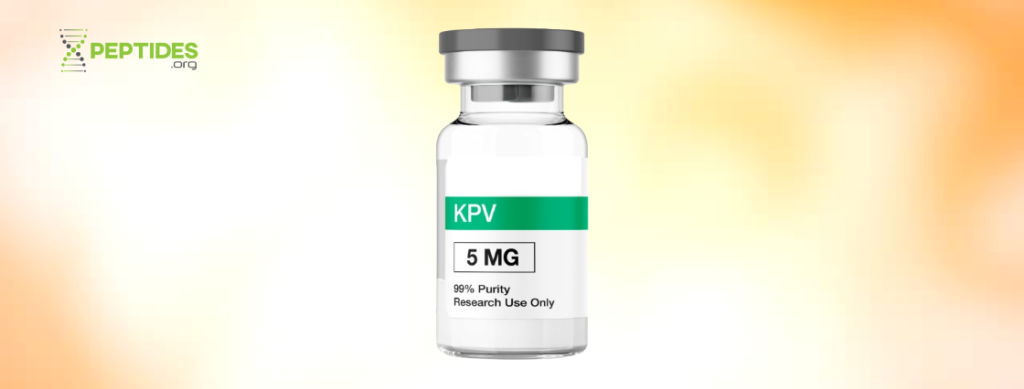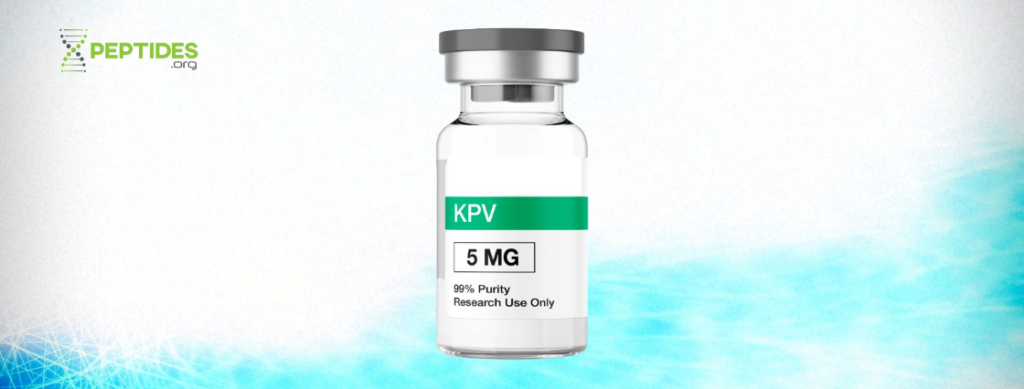For researchers curious about KPV dosage, our peptide review team has got it covered.
KPV is an alpha-MSH derivative known for:
- Reducing inflammation
- Boosting immune function
- Aiding in the recovery of injuries
Researchers interested in a peptide with these capabilities might be curious about the suitable KPV dosage for their next study.
In this guide, we provide an overview of KPV peptide, including its documented benefits and side effects. Plus, we provide a reference KPV dosage calculator and reveal our recommendation of the best place to buy KPV online.
Buy KPV from our top-rated vendor...

Disclaimer: Peptides.org contains information about products that are intended for laboratory and research use only, unless otherwise explicitly stated. This information, including any referenced scientific or clinical research, is made available for educational purposes only. Likewise, any published information relative to the dosing and administration of reference materials is made available strictly for reference and shall not be construed to encourage the self-administration or any human use of said reference materials. Peptides.org makes every effort to ensure that any information it shares complies with national and international standards for clinical trial information and is committed to the timely disclosure of the design and results of all interventional clinical studies for innovative treatments publicly available or that may be made available. However, research is not considered conclusive. Peptides.org makes no claims that any products referenced can cure, treat or prevent any conditions, including any conditions referenced on its website or in print materials.
KPV Dosage Chart | Quick Breakdown
| Method of administration | Subcutaneous KPV | Oral KPV |
| KPV Daily Dosage | 200-400mcg | 250mcg twice daily |
What is KPV?
KPV (lysine-proline-valine) is the C-terminal end of a larger melanocortin peptide hormone called alpha melanocyte-stimulating hormone (α-MSH), which is produced in the body. A melanocortin receptor agonist, α-MSH is synthesized in the pituitary gland of most vertebrates, and is responsible for regulating energy balance [1].
Alpha-MSH and derivatives like melanotan 2 are used in a variety of contexts, including sunless tanning, sexual disorders, and sleep enhancement. Studies have also demonstrated α-MSH’s immunomodulating and anti-inflammatory effects [2].
KPV peptide’s anti-inflammatory effects are particularly notable, due to the fact that it directly influences processes inside the cell. The small molecular size of KPV and α-MSH allows them to enter the cell and interact with inflammatory signaling molecules.
Specifically, they regulate inflammatory responses such as NF-κB activation, the proliferation of T-cells, expression of adhesion molecules, inflammatory cytokines, chemokine receptors, and inflammatory cell migration [2].
Researchers have proposed KPV and α-MSH as suitable treatments for inflammatory skin and bowel disease, fibrosis, allergic and inflammatory pulmonary disease, inflammation of the eyes, and arthritis.
KPV vs. α-MSH | How are the two different?
There are a few key differences to note between KPV and α-MSH.
First, KPV has been found to exert more pronounced anti-inflammatory activity than full-length α-MSH [3].
Also, KPV does not produce the pigmentary effects commonly associated with α-MSH, thus making it a more viable alternative for inflammatory treatment.
Another key difference between KPV and alpha-MSH was outlined in a 2003 study conducted on a model of crystal-induced peritonitis. It was found that in vitro macrophage activation was inhibited by alpha-MSH and MTII, but not by KPV [4].
Unlike most peptides, a KPV dose may be administered not just via injection, but also orally in tablet and spray form, or topically as a cream.

KPV Benefits and Research Applications
While human trials involving KPV are still limited, existing data have shown that this peptide has at least three notable health-boosting effects:
- Antimicrobial effects against pathogens
- Inflammation reduction
- Accelerated wound healing, especially in contexts of burns and skin damage
KPV reduces inflammation
In one study of KPV using a mouse ulcerative colitis model, KPV significantly decreased inflammation in the colon by inhibiting proinflammatory cytokine (molecule) synthesis and secretion [5].
In addition, KPV has been reported to suppress inflammation in bronchial epithelial cells by causing a dose-dependent inhibition of NFκB, IL8, and other inflammatory molecules [6].
KPV accelerates wound healing
Studies have noted that KPV’s wound healing properties attenuate and even eliminate blisters, cracks or crevices. Researchers observed the upregulation of both a-MSH and its receptor in murine cutaneous wound healing as well as human burn wounds and hypertrophic scars [7].
KPV’s antimicrobial effects have been demonstrated on two major pathogens called S. aureus and C. albicans. In one study, KPV significantly inhibited S. aureus from forming colonies [8].
A murine study (n=6) found that intraperitoneal injections of α-MSH reduced the number of leucocytes, mast cells, and fibroblasts at three and seven days after incurring a skin wound. On days 40 and 60, α-MSH caused the scar area of the wound to diminish, and improved the organization of collagen fibers. These findings indicate α-MSH and KPV may be viable alternatives to heal wounds without causing scar tissue to form [9].
Yet another study was conducted to analyze the effects of KPV on corneal epithelial wound healing in rabbits. For a period of four days, rabbits were treated with KPV 1, 5 or 10 mg/ml (30 microl), two drops four times in a day. Within sixty hours, the corneas of all subjects treated with KPV were completely re-epithelized, while none in the placebo group showed signs of healing [10].
KPV promotes colon health
Mice given alpha-MSH showed markedly lower production of TNF alpha by tissues of the lower colon stimulated with concanavalin A; the inhibitory effect of alpha-MSH on production of inflammatory nitric oxide by lower bowel tissue was even greater [11].
Oral administration of HA-KPV NPs in a mouse model exhibited a much stronger capacity to prevent mucosa damage, as well as accelerate mucosal healing [12].
KPV Side Effects
KPV has been reported to be generally well-tolerated based on the results of various animal studies [2, 4, 11]. One study showed that the synthetic peptide (CKPV)2, which was designed based on KPV (α-MSH11-13), showed very low toxicity to host cells [13].
Reported side effects of KPV have included [2, 14]:
- Brain fog
- Orange pigment left on the skin
- Skin irritation
- Gastrointestinal upset
It is not recommended that KPV be administered to subjects who are nursing, may become pregnant, or are already pregnant.
KPV Dosage Calculator and Guide
In this section, we draw upon the KPV and alpha-MSH literature to relate dosing tips and a sample protocol for KPV peptide.
KPV Administration Notes
Researchers should note that human trial data indicating an appropriate KPV dosage are limited, as most studies involving this tripeptide have been carried out on rodents.
- Unlike most other peptides, a KPV dosage may be administered effectively in a number of ways—topically as a cream, injected, or orally via capsules or a spray. The proper method of administration depends on what area needs to be targeted.
- As a topical cream, KPV may be considered for conditions such as acne, eczema, and psoriasis. Anecdotal reports suggest that topical KPV formulations can be applied at 7.5mg twice daily
- In oral form, KPV may help alleviate intestinal issues. Anecdotal reports suggest that oral KPV formulations can be applied at 250mg twice daily
- The injectable form of KPV is typically administered for systemic anti-inflammatory effect. Administering an injectable KPV dosage has exhibited greater bioavailability compared to other forms in contexts involving systemic inflammation and expedited wound healing. The recommended dosage according to anecdotal evidence and expert opinions is 200-400mcg/daily.
Sample KPV Dosage Protocol
For reference purposes, here is a sample KPV protocol for subcutaneous administration.
Researchers may follow this KPV dosage guide when investigating its potential effects of reduced inflammation, as well as accelerated healing of wounds and skin irritation:
- Dosage: 200-400mcg via subcutaneous injection.
- Frequency: Daily.
- Duration: Administer until desired outcome is achieved.
- Notes: Discontinue administration if skin irritation occurs or worsens. One 5mg vial of KPV suffices for up to a 25 day course following this protocol.

Where to Buy KPV Online? | 2024 Edition
Many online peptide vendors follow dubious business practices and source low-quality peptides from overseas, making the task of finding high-quality KPV a difficult one.
Our team of expert peptide reviewers has surveyed the major online vendors, taking into account product purity, shipping speed and coverage, and customer service.
Here is our top recommendation:
Limitless Life
We highly recommend Limitless Life to researchers looking to source highly pure research peptides, including KPV.
In addition to their strict commitments to both product quality and safety, they offer flexible shipping and easy returns to ensure customer satisfaction. Below, we’ve shared more about each of these deciding factors that have led us to recommend Limitless Life:
- Thoroughly Tested Products: Limitless Life offers peptides that are at least 99% pure, verified by independent laboratory testing.
- Domestic and International Shipping Options: By offering rapid order processing and reliable domestic and international shipping options, Limitless Life is a dependable source for peptides that are delivered rapidly.
- Straightforward Reship and Return Process: Proving their commitment to excellent service practices, Limitless Life offers affordable shipping insurance as well as a simple and flexible reships/returns.
- Commitment to Safety: Limitless Life makes it clear that their products are meant to be used only for research. They are dedicated to the safe distribution of peptides.
Limitless Life also offers a unique KPV capsule formulation.
Not to mention, Limitless Life is offering 10% off a future order for qualified peptide researchers. Follow the link below and add our exclusive code:
peptidesorg10
Buy KPV from our top-rated vendor...

Bacteriostatic Water and KPV
KPV is available as a freeze-dried powder for research that requires reconstitution with an appropriate solvent such as bacteriostatic water.
In addition, proper preparation of KPV also demands specific equipment, including sterile containers, disinfectant swabs, and more. Having the right tools is vital for research safety and integrity.
However, sourcing these essentials can be challenging, as not all vendors offer them.
KPV Dosing | Verdict
When looking to investigate a peptide to reduce inflammation or speed up wound healing, researchers may consider purchasing KPV for the next study.
KPV is a powerful chain terminal tripeptide of alpha-MSH, which is produced by melanotrope cells in the intermediate lobe of the pituitary gland. The tripeptide is noted for its anti-inflammatory activity and has been shown to accelerate wound healing.
Researchers planning to explore applications of KPV are advised to visit our top-rated vendor to place their order.
